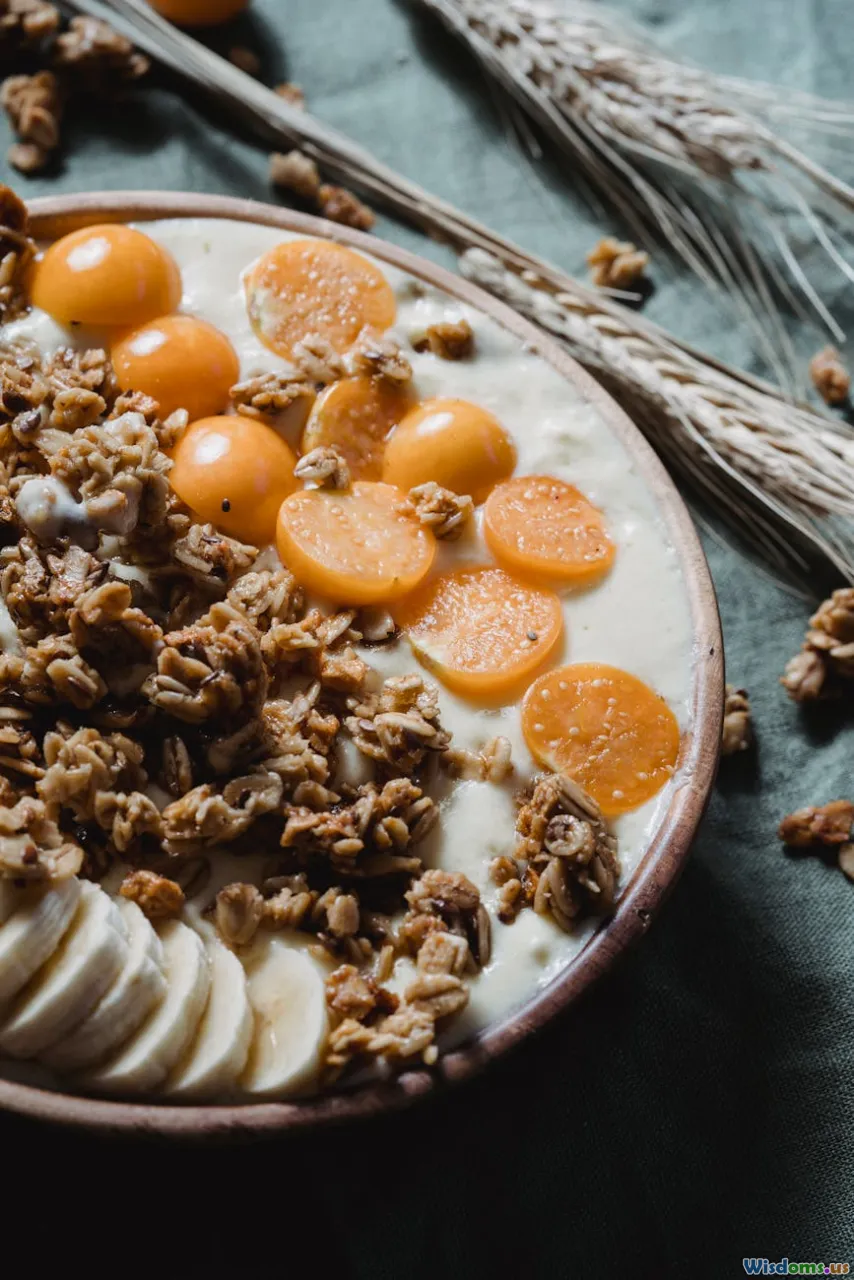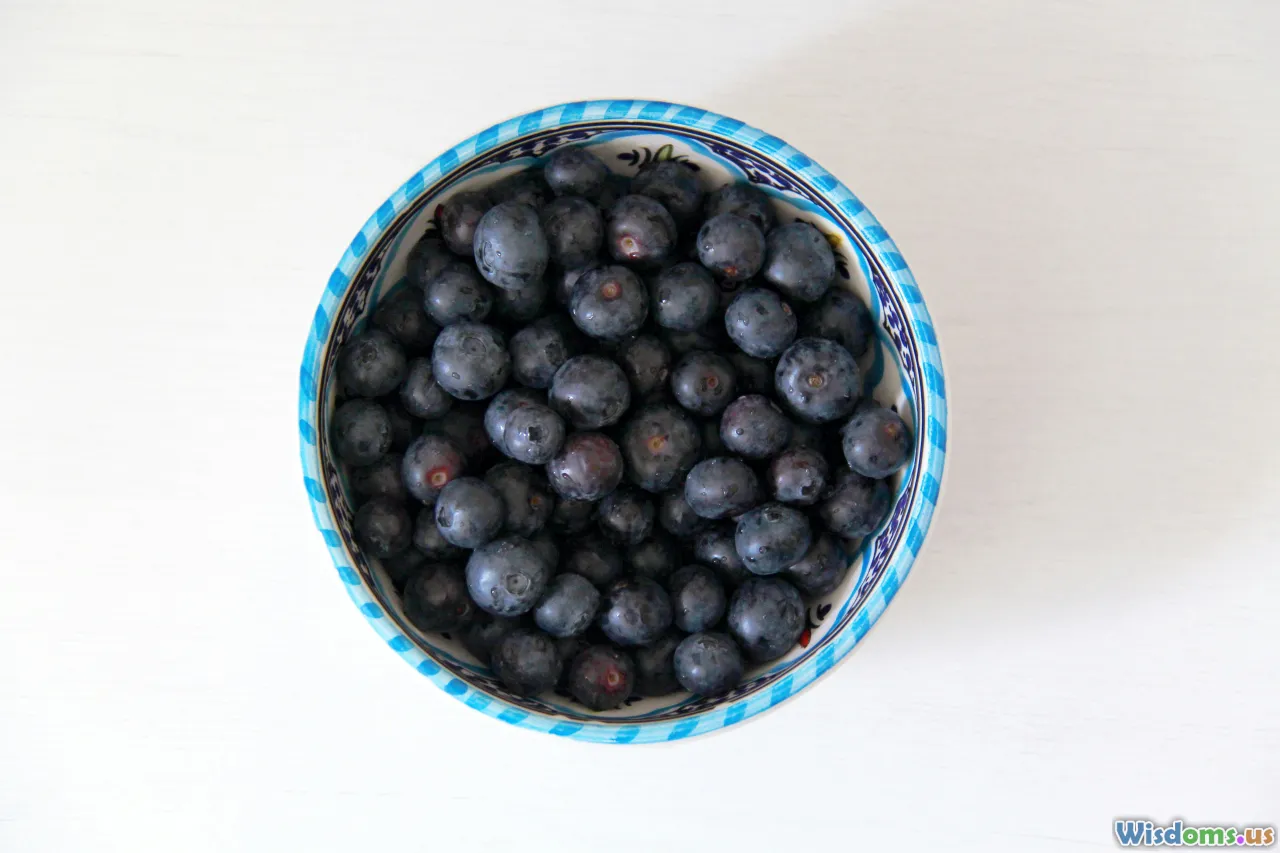
The Surprising Link Between Nutrition and Stress Management
14 min read Explore how nutrition plays a vital role in effective stress management and overall mental well-being. (0 Reviews)
The Surprising Link Between Nutrition and Stress Management
Most of us know that stress is more than just an unpleasant feeling—it’s a whole-body reaction affecting our minds, daily functioning, and even long-term health. But one surprising factor has started gaining attention: the powerful, two-way relationship between what we eat and how we manage stress. Carefully chosen foods can be one of your best allies for resilience, mood regulation, and bounce-back ability in a fast-paced world.
In this article, we uncover how nutrition and stress interact, examine the powerful biological ties, and offer science-backed strategies to reshape your plate for a calmer, more centered you.
The Science: How Diet and Stress Interact

Your Brain and Body on Stress
Stress isn’t just a mental load. When you face work deadlines, family arguments, or even traffic jams, your brain signals a hormone surge, especially cortisol and adrenaline. These hormones put your body into a ‘fight-or-flight’ mode—temporary and helpful in small doses, but chronic stress becomes physically damaging over time.
Research from the American Psychological Association shows that chronic stress is associated with increased inflammation, weakened immunity, disrupted sleep, and spikes in blood pressure. Intriguingly, diet influences many of these same systems.
How Nutrition Affects Stress Pathways
Nutrients like B-vitamins, magnesium, omega-3 fatty acids, and antioxidants help regulate neurotransmitter production and suppress stress-triggered inflammation. For example:
- Omega-3s: A 2021 study in Molecular Psychiatry found that higher omega-3 intake helps reduce anxiety and buffer the effects of chronic psychological stress.
- Magnesium: Essential for nervous system balance, low magnesium can worsen anxiety and sleep issues, according to clinical trials published in Nutrients.
- B-Vitamins: Frequent in whole grains and lean protein, these vitamins support the synthesis of serotonin and dopamine—the ‘feel-good’ neurotransmitters.
In other words, what you eat may literally change your chemical response to stress.
Blood Sugar, Mood Swings, and the Stress Connection

Foods That Fuel the Roller Coaster
Consider those times you reached for sugary sweets or caffeinated drinks as a pick-me-up. While these give rapid energy, they often increase mood volatility and ultimately lead to the dreaded ‘crash.’ Repeated spikes and drops in blood sugar can leave you feeling more anxious, tired, and frazzled.
A study in The British Journal of Psychiatry found that diets high in refined sugars and processed fats correlated with increased reports of anxiety and depressive symptoms.
How to Smooth Out Stress-Induced “Lows”
Stabilizing blood sugar, especially during stressful times, is foundational. Here’s how:
- Prioritize Slow-Carb, High-Fiber Foods: Whole grains (oats, brown rice, quinoa), beans, lentils, and fibrous vegetables release glucose gradually, providing sustained energy and avoiding sharp insulin spikes.
- Intentional Snacking: Pair fruits with nuts or low-fat yogurt—protein and healthy fats decrease the absorption rate of sugars, smoothing out the energy curve.
- Hydration Matters: Even mild dehydration mimics symptoms of fatigue and stress; water supports stable blood sugar and mood.
By embracing steady, nourishing foods, you prevent the blood sugar roller coaster from amplifying emotional turbulence.
Key Nutrients for Building Stress Resilience

Top Stress-Busting Nutrients—and Where to Find Them
Certain micronutrients have established calming effects. Consider featuring these more often:
- Magnesium: Almonds, spinach, pumpkin seeds, black beans
- Zinc: Chickpeas, cashews, oysters, pumpkin seeds
- Vitamin C: Red bell peppers, oranges, kiwi, broccoli
- B-Vitamins: Eggs, salmon, whole-grain bread, leafy greens
- Omega-3 Fatty Acids: Fatty fish (salmon, sardines), walnuts, flaxseed
- Probiotics: Yogurt with live cultures, kefir, miso, sauerkraut
Real-World Example
Sarah, a busy marketing manager, experienced midday ‘crashes’ and recurring irritability. Upon consultation, shifting her lunch from deli sandwiches and chips to a salad rich in leafy greens, pumpkin seeds, hard-boiled egg, and a citrus vinaigrette made a tangible difference. Three weeks into this routine, her energy steadied, and her mood became noticeably brighter.
This subtle shift underscores how practical dietary improvements, not perfection, produce meaningful results.
The Gut-Brain Axis: Why Microbiome Matters More Than Ever

Understanding the Gut-Brain Connection
You may have heard your gut called your ‘second brain.’ That’s because the gut and central nervous system communicate through a complex network (the vagus nerve), and the trillions of bacteria (the microbiome) in your digestive tract influence mood, memory, and stress response.
A 2019 review in Frontiers in Psychiatry summarized over 30 studies showing that people with more diverse gut bacteria reported fewer anxiety symptoms. Fermented foods and prebiotic fibers seem especially helpful.
How to Feed Your Microbiome for Stress Resilience
- Add Probiotic Foods: Plain yogurt with live cultures, kefir, kimchi, sauerkraut, or miso support healthy bacteria blooms.
- Eat Prebiotic-Rich Plant Foods: Garlic, onions, asparagus, bananas, and whole grains feed the microbiome so that it produces calming short-chain fatty acids.
- Limit Ultra-Processed Foods: The typical ‘Western’ diet high in saturated fat, sugar, and additives can disrupt the gut lining and crowd out beneficial bacteria.
Taking care of your gut may be one of the least obvious but most effective ways to reduce anxiety and improve stress tolerance over time.
Superfoods for Stress Management: Fact or Fiction?

Sorting Evidence from Hype
Media often touts ‘superfoods’ as miracle ingredients for a relaxed mind. But is the buzz justified?
- Blueberries: These tiny powerhouses contain flavonoids with demonstrated neuroprotective effects. A 2020 paper in Nutrients found regular blueberry consumers showed improved mood and cognitive function under stress.
- Dark Chocolate: Rich in magnesium and polyphenols, moderate dark chocolate (above 70% cocoa) reduces cortisol and fosters feelings of wellbeing, per a randomized trial in the Journal of Psychopharmacology.
- Green Tea: The amino acid L-theanine, unique to green tea, provides calming effects without sedation. Studies show better focus and reduced anxiety in regular consumers.
The Bottom Line
Superfoods can play a role, but what matters most is consistency with a diet rich in plants, lean proteins, nuts, seeds, and healthy fats. Fads won’t beat stress, but a varied, colorful plate will stack the odds in your favor.
The Vicious Cycle: When Stress Triggers Poor Nutrition—And Vice Versa

Emotional Eating and Stress Choices
Ever binge on cookie dough after a tough day or grab takeout to avoid cooking? You’re not alone. Stress increases cravings for calorie-dense comfort foods and heightens reward pathway activation (especially in the brain’s hypothalamus), research from Appetite shows.
While these foods can provide short-term comfort, they often exacerbate fatigue, irritability, and guilt, and, ironically, make it harder for your body to deal with future stressors. This forms a toxic loop: stress promotes poor eating; poor choices raise stress susceptibility.
Strategies for Breaking the Pattern
- Make Healthy Foods Easy to Reach: Stock fruit, roasted chickpeas, or unsalted nuts in sight. Pre-chop veggies or keep hummus at eye level in your fridge.
- Pause Before You Eat: Stress urges action. Pause, take five deep breaths, and ask, “Am I hungry or overwhelmed?” Awareness is your first line of defense.
- Practice Mindful Eating: Savor flavors and textures, eat without screens or rush, and notice how different foods affect your post-meal mood.
Deliberate, small choices break the loop and reestablish a foundation for resilience.
Putting It Into Practice: Your Stress-Buffering Eating Plan

Step-by-Step: Building a Day of Stress-Resilient Meals
Breakfast
- Example: Overnight oats with blueberries, chia seeds, walnuts, and a dollop of probiotic-rich yogurt.
- Why: Complex carbs, antioxidants, healthy fats, and live cultures start the day with focus and balanced energy.
Lunch
- Example: Quinoa and spinach salad with chickpeas, roasted sweet potatoes, sliced peppers, pumpkin seeds, and lemon vinaigrette.
- Why: Plant fibers, magnesium, vitamin C, and stabilizing protein boost mood and regulate blood sugar.
Snack
- Example: Apple with almond butter or carrot sticks with hummus.
- Why: Natural sweetness satisfies, with protein and fat to sustain you without crashes.
Dinner
- Example: Grilled salmon with roasted broccoli, brown rice, and a side of kimchi.
- Why: Omega-3s for brain health, plenty of fiber, and probiotic kick for the microbiome.
Batch Cooking and Mindful Shopping
Cooking when you’re stressed is tough; batch prepping meals in advance ensures smart choices are within arm’s reach. Some tips:
- Use a slow cooker to prepare lentil stews or chili.
- Make extra portions and freeze single servings.
- Build a weekly grocery list with whole, minimally processed foods at its core.
Even modest preparation can save your future self a lot of stress. View your kitchen as a toolkit for resilience.
Beyond Food: Pairing Nutrition With Lifestyle Changes

Nutrition Is Powerful, But Not a Solo Act
Optimal stress management is holistic. Nutrition works best when shared with other supportive habits. For example:
- Regular Physical Activity: Exercise lowers cortisol and triggers the release of revitalizing endorphins.
- Restorative Sleep: Nutrition and good sleep go hand-in-hand—balanced meals improve sleep quality, which reduces next-day stress cravings.
- Mindfulness and Connection: Mindful eating, yoga, meditation, or even deep breathing enhance self-awareness and help you make nurturing food choices.
Pairing solid nutrition with movement, rest, and community offers a multiplier effect on mental well-being.
Every stressful season presents a chance to re-examine the relationship between what we eat and how we feel. By filling your plate with mood-boosting nutrients, balancing blood sugar, nurturing your microbiome, and creating mindful routines, you build an internal buffer—fortifying both mind and body against life’s inevitable storms. Choose nourishing foods, not out of discipline alone, but as a form of gentle self-care that can transform your daily experience from the inside out.
Rate the Post
User Reviews
Popular Posts


















